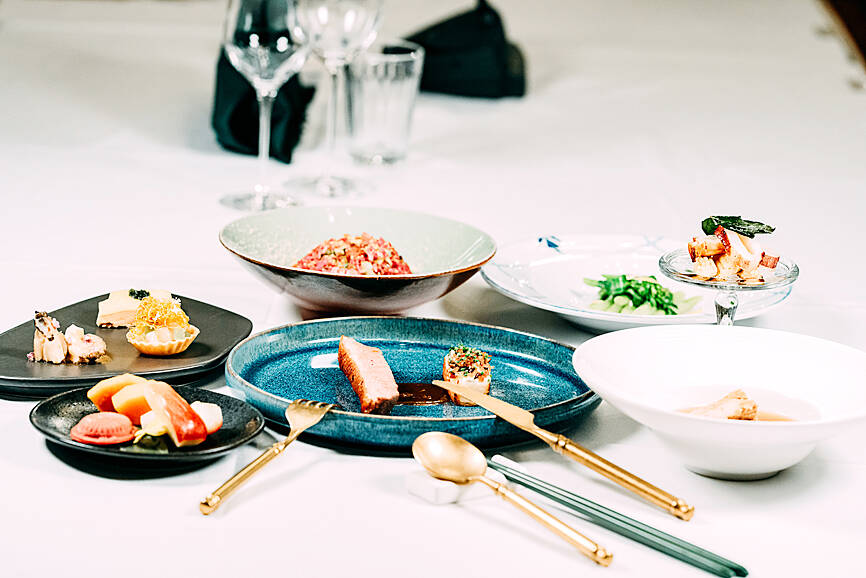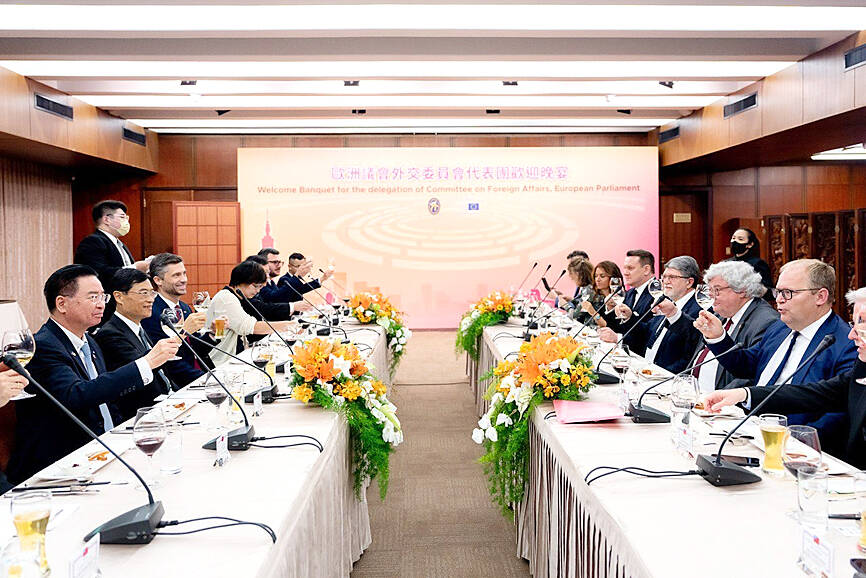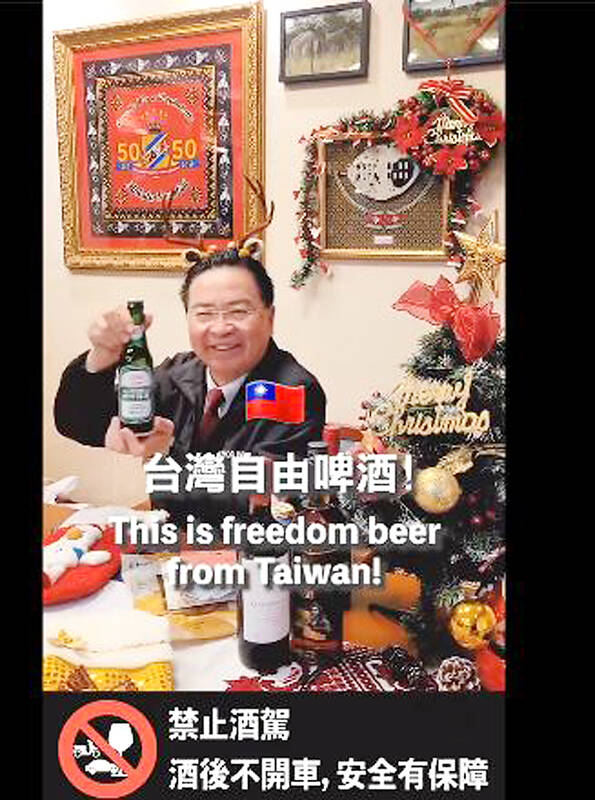As the nation’s international visibility continues to rise and the situation in the Taiwan Strait gains more global attention, larger delegations of the nation’s higher-level foreign friends choose to show their support by visiting in-person. It is the Ministry of Foreign Affairs Department of Protocol’s job to ensure the guests enjoy their time in Taiwan, especially at the dinner table.
Organizing diplomatic feasts is no small feat, department officials said, adding that from designing the menus to communicating with catering service providers and attending to the diners at the banquets, everything can go wrong, yet nothing can really go wrong.
It requires attention to detail, spontaneity and ingenuity, the ministry added.

Photo courtesy of the Ministry of Foreign Affairs
Preparation is key, and as the saying goes — the devil is in the details, it said, adding that almost every decision is made to facilitate conversation, which is the top priority for such occasions.
The preparation starts with knowing your enemy --- no --- your guests. Dietary restrictions due to allergies or religions must be strictly followed. These not only affect what they can eat, but sometimes when they can eat.
For example, during Ramadan, banquets for Muslim guests can only be arranged after sunset and dates should be prepared for them to break the fast with, as it is tradition and easy on the digestive system.

Photo courtesy of the Ministry of Foreign Affairs
After the taboos are identified and avoided, there are still countless choices to be made, including the location, the menu, the seating and even the shape of the tables.
The majority of the banquets are held at the ministry, the Taipei Guest House or hotels, depending on factors such as the ranks and the itineraries of the hosts and the guests, the department said.
Only the president, vice president, premier, minister of foreign affairs and the Presidential Office secretary-general can host banquets at the Taipei Guest House, as stipulated by law, and usually only for foreign ministers or those of a higher rank.

Photo: Screen grab from the ministry’s X account
During the COVID-19 pandemic, long tables, instead of round tables were used for easier installation of partitions, the department said. The practice continues post-pandemic as guests found it easier to engage in conversation while sitting at long tables, the department said.
The big day could be daunting as surprises are almost a guarantee, it said. The guests might arrive late, which would affect the timing when dishes have to be prepared and served. A no-show does not mean one fewer person to worry about, as there cannot be an empty seat at the table.
SURPRISE CHANGES
A guest who claims to be a vegetarian might ask for the steak that their neighbors seem to be enjoying so much, while another suddenly decides to refrain from a particular ingredient and another would like a second serving. They should all be satisfied without being put on the spot, and the head of the delegation and the host should definitely not be disturbed or alarmed, it said.
Taiwan is known for its abundant produce and great food so the menu must not disappoint. So what is on the menu?
The menu is designed with the image of Taiwan and the palate of the guests in mind. Banquets are good opportunities to show off Taiwanese ingredients and introduce foreign guests to traditional Taiwanese cuisine.
However, people from landlocked countries might be unfamiliar with most seafood, and beef that is not cooked well-done might startle others, the department said.
A quick question: What do these ingredients have in common — pineapple, sugar apple, wax apple, mango and grouper?
The answer: All of them are or have been banned by China. The unreasonable import bans caused these products to be regulars on the menu as they are not only delicious, but also great conversation starters, the department said.
Ingredients imported from the guests’ countries are sometimes incorporated in the dishes as a gesture of support and a symbol of friendship, it said.
All the dishes have to be easy to eat, so rice is preferable to noodles; bones, skins and shells are almost always removed before the plate is sent out, it said.
The names of dishes might be creative and flowery in Mandarin, but they should be easily understood in English to reassure the diners, it said, adding that the dishes served should require little explanation. For instance, dipping fried dough sticks (油條) in the accompanied almond tea (杏仁茶) might not be straightforward to most of the guests, and might be a dish that is best avoided.
Guests celebrating their birthdays during the trip to Taiwan would receive a surprise birthday cake at the banquet, and those who reveal their love for a particular Taiwanese dish might have their wishes fulfilled too — the true spirit of Taiwanese hospitality.
Taiwan’s famous xiaolongbao (小籠包), or juicy soup dumplings, was added to the banquet menu at the last minute after a member of the US delegation that visited the nation earlier this year expressed regret at not being able to try it due to their busy schedule, the department shared.
As guests do not usually provide feedback on the food, satisfied smiles and clean plates speak louder than words, it said.
The department also revealed that Minister of Foreign Affairs Joseph Wu (吳釗燮) is not picky about food and enjoys promoting Taiwan’s “freedom beer” at the banquets.

DEFENSE: The National Security Bureau promised to expand communication and intelligence cooperation with global partners and enhance its strategic analytical skills China has not only increased military exercises and “gray zone” tactics against Taiwan this year, but also continues to recruit military personnel for espionage, the National Security Bureau (NSB) said yesterday in a report to the Legislative Yuan. The bureau submitted the report ahead of NSB Director-General Tsai Ming-yen’s (蔡明彥) appearance before the Foreign and National Defense Committee today. Last year, the Chinese People’s Liberation Army (PLA) conducted “Joint Sword-2024A and B” military exercises targeting Taiwan and carried out 40 combat readiness patrols, the bureau said. In addition, Chinese military aircraft entered Taiwan’s airspace 3,070 times last year, up about

A magnitude 4.3 earthquake struck eastern Taiwan's Hualien County at 8:31am today, according to the Central Weather Administration (CWA). The epicenter of the temblor was located in Hualien County, about 70.3 kilometers south southwest of Hualien County Hall, at a depth of 23.2km, according to the administration. There were no immediate reports of damage resulting from the quake. The earthquake's intensity, which gauges the actual effect of a temblor, was highest in Taitung County, where it measured 3 on Taiwan's 7-tier intensity scale. The quake also measured an intensity of 2 in Hualien and Nantou counties, the CWA said.

The Overseas Community Affairs Council (OCAC) yesterday announced a fundraising campaign to support survivors of the magnitude 7.7 earthquake that struck Myanmar on March 28, with two prayer events scheduled in Taipei and Taichung later this week. “While initial rescue operations have concluded [in Myanmar], many survivors are now facing increasingly difficult living conditions,” OCAC Minister Hsu Chia-ching (徐佳青) told a news conference in Taipei. The fundraising campaign, which runs through May 31, is focused on supporting the reconstruction of damaged overseas compatriot schools, assisting students from Myanmar in Taiwan, and providing essential items, such as drinking water, food and medical supplies,

New Party Deputy Secretary-General You Chih-pin (游智彬) this morning went to the National Immigration Agency (NIA) to “turn himself in” after being notified that he had failed to provide proof of having renounced his Chinese household registration. He was one of more than 10,000 naturalized Taiwanese citizens from China who were informed by the NIA that their Taiwanese citizenship might be revoked if they fail to provide the proof in three months, people familiar with the matter said. You said he has proof that he had renounced his Chinese household registration and demanded the NIA provide proof that he still had Chinese